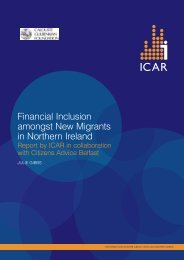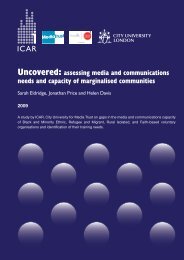Navigation guide Refugee populations in the UK: Algerians - ICAR
Navigation guide Refugee populations in the UK: Algerians - ICAR
Navigation guide Refugee populations in the UK: Algerians - ICAR
You also want an ePaper? Increase the reach of your titles
YUMPU automatically turns print PDFs into web optimized ePapers that Google loves.
Profile of <strong>the</strong> Algerian population <strong>in</strong> <strong>UK</strong><br />
This section turns to <strong>the</strong> Algerian population <strong>in</strong> <strong>the</strong> <strong>UK</strong>, present<strong>in</strong>g an overall profile. It is unfortunately only a<br />
partial picture as <strong>the</strong>re has been very little research on <strong>the</strong> Algerian population <strong>in</strong> <strong>the</strong> <strong>UK</strong>. The total number<br />
of <strong>Algerians</strong> present <strong>in</strong> <strong>the</strong> <strong>UK</strong> is currently estimated at between 25,000 and 30,000 people. Even <strong>the</strong> most<br />
significant study that exists only <strong>in</strong>terviewed 30 <strong>in</strong>dividuals 39 and o<strong>the</strong>r studies focused on <strong>Algerians</strong> have<br />
spoken to even fewer people. 40 <strong>Algerians</strong> figure <strong>in</strong> more general work but typically <strong>in</strong> even fewer numbers. 41<br />
<strong>Refugee</strong> support groups and o<strong>the</strong>r NGOs are of course <strong>in</strong> touch with many more <strong>in</strong>dividuals but few keep<br />
detailed records of <strong>the</strong>ir client group, and some do not even record <strong>the</strong> nationality of <strong>the</strong>ir clients.<br />
Even where records exist, <strong>the</strong>se are not much larger than <strong>the</strong> studies undertaken; <strong>the</strong> largest data source<br />
<strong>the</strong> author was able to consult recorded only nationality, gender and qualifications for 242 <strong>in</strong>dividuals. The<br />
<strong>in</strong>formation that follows is based on <strong>the</strong> small pool of research that exists, material gleaned from broader<br />
studies of <strong>the</strong> <strong>UK</strong> population, <strong>in</strong>formation obta<strong>in</strong>ed from NGOs and <strong>in</strong>terviews with service providers,<br />
lawyers, NGO workers, refugee community organisations and key members of <strong>the</strong> Algerian community. 42 It<br />
is by no means a complete picture, and may conta<strong>in</strong> considerable <strong>in</strong>accuracies, but can be considered <strong>the</strong><br />
most accurate profile that is currently available.<br />
Gender<br />
Available evidence suggests that <strong>the</strong> Algerian population <strong>in</strong> <strong>the</strong> <strong>UK</strong> is overwhelm<strong>in</strong>gly male.<br />
• Of those recorded as be<strong>in</strong>g born <strong>in</strong> Algeria by <strong>the</strong> 2001 census, 70.5% were male.<br />
• Support services and lawyers <strong>in</strong> London work<strong>in</strong>g with <strong>Algerians</strong> reported that <strong>the</strong> Algerian client<br />
group was comprised of between zero and eight per cent women. 43<br />
Possible explanations may be that:<br />
• Algerian women are present <strong>in</strong> larger numbers but do not use services;<br />
• Algerian women are more likely to live with relatives and s<strong>in</strong>ce <strong>Algerians</strong> are concentrated <strong>in</strong> France<br />
<strong>the</strong>ir family is more likely to be located <strong>the</strong>re;<br />
• <strong>the</strong> <strong>UK</strong> is generally reached by undocumented migration and women are less prepared to resort to<br />
undocumented migration than men.<br />
39 Collyer, M. (2002) ‘Expla<strong>in</strong><strong>in</strong>g change <strong>in</strong> established migration systems: <strong>the</strong> movement of <strong>Algerians</strong> to France and<br />
<strong>the</strong> <strong>UK</strong>’ University of Sussex, DPhil <strong>the</strong>sis, bound and recorded at <strong>the</strong> British Library. A summary of this research is<br />
available as Collyer, M. (2003) ‘Expla<strong>in</strong><strong>in</strong>g change <strong>in</strong> established migration systems: <strong>the</strong> movement of <strong>Algerians</strong> to<br />
France and <strong>the</strong> <strong>UK</strong>’ Sussex Migration Work<strong>in</strong>g Paper 15, Sussex Centre for Migration Research, Brighton. Available at<br />
http://www.sussex.ac.uk/migration/publications/work<strong>in</strong>g_papers/mwp16.pdf.<br />
40 Rocheron, Y. (2002) ‘Paradoxes of Hijrah (Exile): Tales from Algerian Men <strong>in</strong> Brita<strong>in</strong>’ <strong>in</strong> S. Ouditt ed. Displaced<br />
persons: Conditions of exile <strong>in</strong> European culture. Ashgate, Aldershot.<br />
41 Nagel, C. (2001) ‘Hidden m<strong>in</strong>orities and <strong>the</strong> politics of ‘race’: <strong>the</strong> case of British Arab activists <strong>in</strong> London’ Journal of<br />
Ethnic and Migration Studies 27.<br />
42 The bulk of this formed part of <strong>the</strong> author’s DPhil research, although a number of organisations and <strong>in</strong>dividuals were<br />
contacted as part of <strong>the</strong> research for this <strong>guide</strong> <strong>in</strong> January and February 2003 to confirm that <strong>the</strong> issues are still<br />
relevant.<br />
43 Collyer, M. (2002) ‘Expla<strong>in</strong><strong>in</strong>g change <strong>in</strong> established migration systems: <strong>the</strong> movement of <strong>Algerians</strong> to France and<br />
<strong>the</strong> <strong>UK</strong>’ University of Sussex, DPhil <strong>the</strong>sis, bound and recorded at <strong>the</strong> British Library.<br />
<strong>Navigation</strong> <strong>guide</strong> to refugee <strong>populations</strong>: <strong>Algerians</strong><br />
©<strong>ICAR</strong> 2004, moral rights Michael Collyer<br />
17

















